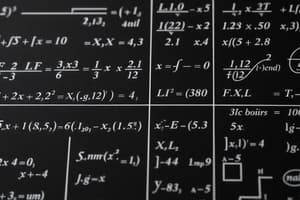Podcast
Questions and Answers
What is linear programming primarily used for?
What is linear programming primarily used for?
- Deriving complex mathematical theories
- Calculating basic arithmetic operations
- Finding roots of polynomial equations
- Solving optimization problems within constraints (correct)
Which skill involves using logical arguments to solve problems?
Which skill involves using logical arguments to solve problems?
- Formula manipulation
- Symbolic manipulation
- Mathematical reasoning (correct)
- Visualization
Which of the following is NOT a potential learning aid mentioned?
Which of the following is NOT a potential learning aid mentioned?
- Mathematical competitions (correct)
- Study groups
- Practice problems
- Tutors
What is a key aspect of visualization in mathematics?
What is a key aspect of visualization in mathematics?
What should students utilize for targeted preparation in BTech Maths 1?
What should students utilize for targeted preparation in BTech Maths 1?
Which branch of mathematics focuses on the relationships between angles and sides of triangles?
Which branch of mathematics focuses on the relationships between angles and sides of triangles?
What is the main focus of probability and statistics in mathematics?
What is the main focus of probability and statistics in mathematics?
What does the process of differentiation involve?
What does the process of differentiation involve?
Which of the following is NOT a type of function studied in a BTech maths course?
Which of the following is NOT a type of function studied in a BTech maths course?
Which mathematical concept deals specifically with distinct values and counting?
Which mathematical concept deals specifically with distinct values and counting?
What is the purpose of integration in calculus?
What is the purpose of integration in calculus?
In which area would you study vectors and their applications?
In which area would you study vectors and their applications?
What does understanding limits and continuity involve in calculus?
What does understanding limits and continuity involve in calculus?
Flashcards
Linear Programming
Linear Programming
Finding best solutions to problems with limits (constraints) using graphs.
Problem-solving (Math)
Problem-solving (Math)
Turning real-world issues into math equations/models.
Mathematical Reasoning
Mathematical Reasoning
Using logic to solve math problems.
Visualization
Visualization
Signup and view all the flashcards
BTech Maths Learning Aids
BTech Maths Learning Aids
Signup and view all the flashcards
Calculus
Calculus
Signup and view all the flashcards
Differentiation
Differentiation
Signup and view all the flashcards
Integration
Integration
Signup and view all the flashcards
Functions
Functions
Signup and view all the flashcards
Limits and Continuity
Limits and Continuity
Signup and view all the flashcards
Vectors
Vectors
Signup and view all the flashcards
Matrices
Matrices
Signup and view all the flashcards
Differential Equations
Differential Equations
Signup and view all the flashcards
Study Notes
Core Concepts
- Calculus: A foundational branch of mathematics dealing with continuous change. Includes differential and integral calculus.
- Algebra: The study of mathematical symbols and the rules for manipulating them. Includes solving equations, factoring polynomials, and working with functions.
- Geometry: The study of shapes, sizes, and properties of figures, including lines, points, and planes.
- Trigonometry: The study of relationships between angles and sides of triangles. Involved in functions and their applications.
- Discrete Mathematics: Deals with distinct, separate values, sets, logic, and counting, rather than continuous values. Used in computer science and other areas.
- Probability and Statistics: Focuses on analyzing data and quantifying uncertainty. Essential for interpreting and drawing conclusions from data.
Specific Topics (likely covered in a BTech maths 1 course)
- Limits and Continuity: Understanding the behavior of functions as input values approach a particular value. Establishing if a function's graph is unbroken within a given interval.
- Differentiation: Finding the instantaneous rate of change of a function (its derivative). Used for calculating slopes of tangents to curves, optimization problems, and other applications.
- Integration: Finding the area under a curve or the accumulation of a quantity over an interval. Used for calculating areas, volumes, and work done.
- Functions: Different types of functions (linear, quadratic, polynomial, exponential, logarithmic, trigonometric) and their properties. Understanding function transformations like shifting, stretching, and reflecting.
- Sequences and Series: Understanding infinite sequences and series, convergence and divergence.
- Matrices and Determinants: Working with matrices, performing matrix operations, and calculating determinants. Essential in linear algebra.
- Vectors and 3D Geometry: Understanding vectors in 2D and 3D space. Finding vector magnitudes, direction vectors, dot products, and cross products. Applications in physics.
- Differential Equations: Solving equations involving derivatives. Essential in many applied sciences.
- Complex Numbers: Understanding complex numbers, performing operations, representing them graphically.
- Vectors: Defining vectors, operations on vectors, vector spaces, and application of vectors.
- Linear Programming: Solving optimization problems within constraints defining geometric regions.
Important Mathematical Skills
- Problem-solving: Ability to translate real-world problems into mathematical representations.
- Mathematical reasoning: Using logical arguments and deductive reasoning to solve problems.
- Symbolic manipulation: Applying appropriate mathematical rules and procedures correctly.
- Visualization: Representing abstract concepts graphically to enhance understanding.
- Applications: Connecting mathematical concepts to problems in science, technology, engineering, and mathematics.
- Formula manipulation: Applying and deriving relevant formulas effectively.
Potential Learning Aids
- Textbook: Dedicated textbook for the BTech Maths 1 course.
- Online resources: Webpages, lectures, and problem-solving guides
- Study groups: Collaborating with peers on problems and explanations.
- Practice problems: Completing exercise sets within the textbook and/or supplementary materials.
- Tutors: Engaging a tutor to enhance understanding of complex topics.
Note on specific content:
- The precise topics and depth of coverage in BTech Maths 1 will vary depending on the specific curriculum and university. These notes provide a general overview. Studying the course syllabus will be essential for targeted preparation.
Studying That Suits You
Use AI to generate personalized quizzes and flashcards to suit your learning preferences.




